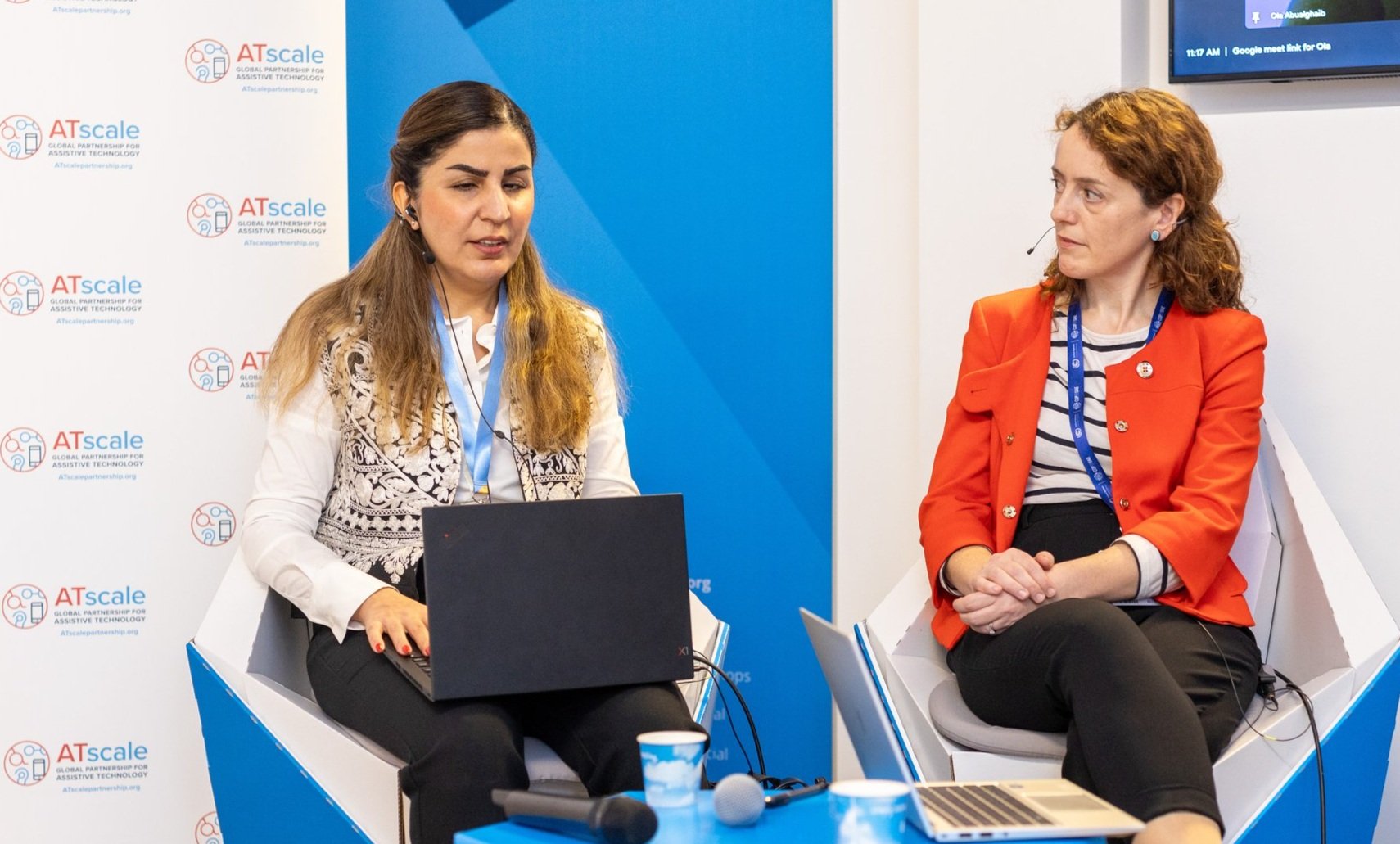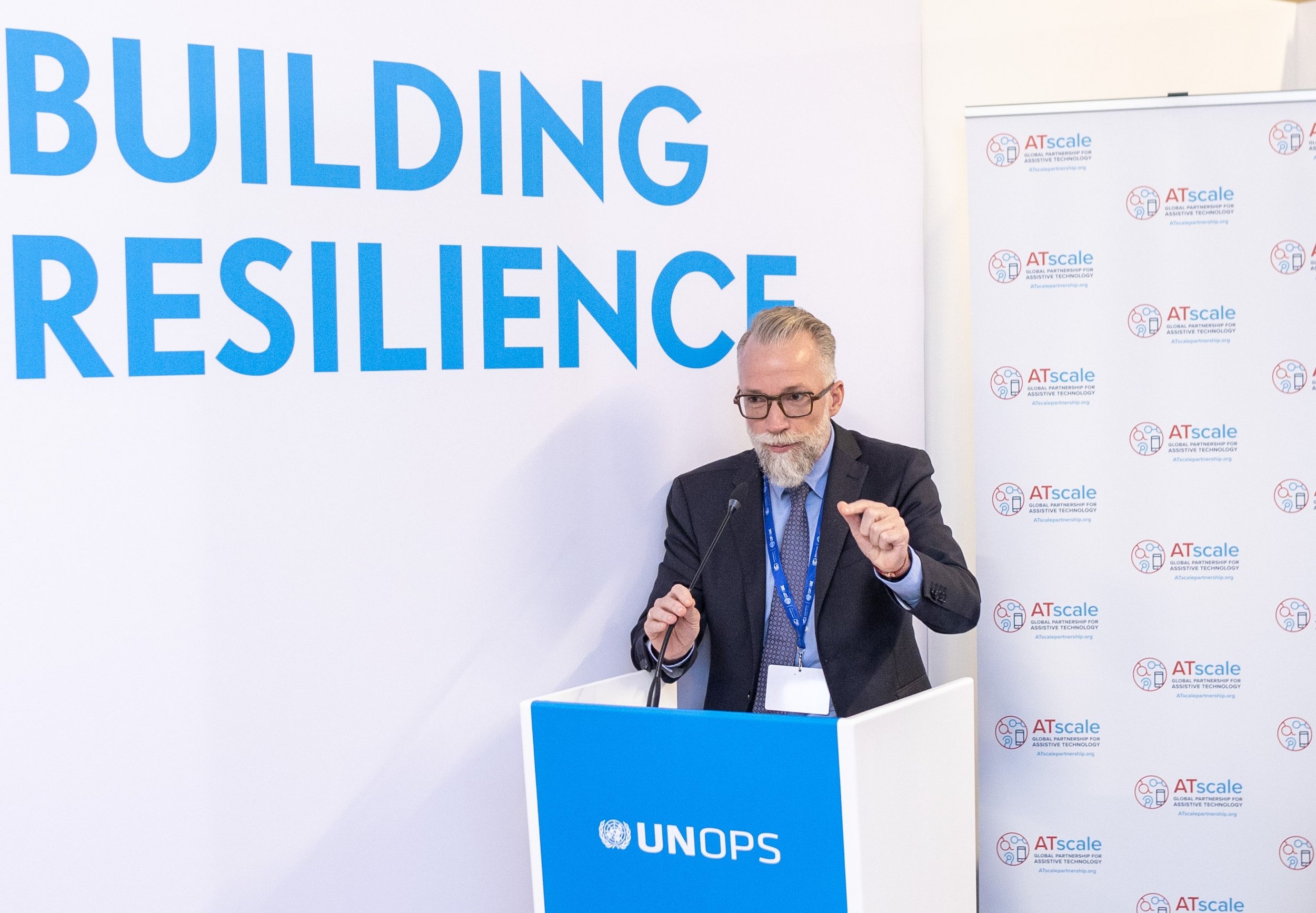Ensuring inclusion of persons with disabilities and older people in climate action through sustainable assistive technology
ATscale and its partners hosted a dialogue in the UNOPS Pavilion at COP28 in Dubai about the largely uncharted nexus of assistive technology, climate action, and disability and inclusion.
The climate crisis puts people facing vulnerability at risk, such as persons with disabilities, including women and girls, and older populations. The session brought together experts, decision makers and people with lived experience with the goal to enhance our understanding of how climate change adversely impacts people who use or need to use assistive technology. Beyond addressing some of the key challenges and gaps in this domain, the speakers also discussed approaches and innovations for ensuring the inclusion of people in vulnerable situations in climate action.
The session included representatives from the International Disability Alliance (IDA), UN Partnership on the Rights of Persons with Disabilities (UNPRPD), the African Disability Forum, Global Disability Innovation Hub (GDI Hub), FCDO and UNOPS.
Below is an overview of the key points made by the speakers and panelists through a photo journey.
Elham Youssefian, Senior Adviser - Humanitarian, DRR and Climate Action, International Disability Alliance (moderator)
“People who use assistive technology devices are at the highest risk during climate related disasters. Access to AT is an important way for people to protect themselves from harm. At the same time, access to AT is essential for citizens with disabilities to play their role in fighting climate change and being part of the solution.”
Emilie Potvin, Director, Partnerships and Liaison Group, UNOPS
“Assistive Technology is not just a necessity; it's a lifeline for advancing inclusion, equity, human rights, and achieving the Sustainable Development Goals. Yet, the reality is that assistive technology remains a historically neglected and under-resourced area. Our commitment is addressing disparities, and ensuring that assistive technology becomes an integral part of the inclusive journey towards a sustainable and equitable climate safe future.”
Ola Abu al Ghaib, Manager Technical Secretariat, UN Partnership on the Rights of Persons with Disabilities, UNDP
“Evidence shows that climate change is unfortunately already impacting persons with disabilities more than other citizens across the globe. That is why discussions as we are having today are very important. Recent evidence shows that only 10% of persons with disabilities are aware of their country's plans on disaster risk reduction (DRD). In addition, very few organizations of persons with disabilities are engaged in those DRD processes. This is the time for collective action to ensure that persons with disabilities will be both prepared as well as protected from the harms of climate change.”
Shitaye Astawes, Director of Advocacy and Communication, African Disability Forum, Ethiopia
“Across the African Region, persons with disabilities and people using assistive devices are hugely affected, not only by climate change, but also by the fragile peace and security situation. A major challenge is the absence of data and evidence. National governments and international development agencies currently do not know how many people are in need of AT. We need to strengthen our movement building and advocacy work for stronger social protection systems on the African continent.”
Amy Clemitshaw, Head of the Women & Girls Department, FCDO, UK
“When extreme weather events happen, women and girls are more likely to feel the immediate effects. We also know that women are also more likely to be disabled than men, so we need to consider how intersecting disadvantages leave some groups particularly at risk. So if we’re clear that climate change disproportionately affects people with disabilities, it’s right that we are here today asking ourselves how we can ensure our interventions address this: assistive technology is a critical part of the answer. For the UK, support for assistive technology is one of our key disability-specific interventions. We need new, more innovative products that will transform people’s lives, and we need to get products to where they are needed.”
Mikaela Patrick, Head of Inclusive Infrastructure and Climate, Global Disability Innovation Hub, UK
“When driving accessibility in cities and infrastructure, we need to consider the diversity and intersectionality of disability, the different needs that people have, including the different experiences of women and girls with disabilities. Accessibility is not a tick-box exercise, it is about making people's lives better. This is also key to ensuring that the assistive technology remains sustainable, which is especially relevant in a changing climate.
We cannot have inclusive climate action without innovation, while innovation needs to be inclusive and accessible. There are promising innovations in AT that now need to be brought to scale. However, in a changing climate, innovations should focus on assistive technology that is low carbon and uses renewable energy.”
Key take-aways from Pascal Bijleveld, CEO, ATscale
The climate action space has been making progress in being more inclusive, but we still have a long way to go until this issue is part of the main agenda. There are four key take-aways:
We need to increase investments in generating more data and evidence, including about issues relevant to the climate debate;
Looking through the lens of intersectionality allows us not to oversimplify and bring nuance, recognizing that there are many forms of disabilities and people who need assistive technology and, consequently, have different needs;
We need to continue to engage different voices of people that are not usually part of climate conversations, such as users of assistive technology, persons with disabilities, older people, youth, women and girls;
Last, but not least, governments have a responsibility to put into action the commitments made and conventions signed. We need to hold them, and each other, to account and should be tracking better those commitments, especially relating to climate action.
Next Steps:
ATscale will develop a white paper in 2024 around the relevant links between assistive technology and climate action.
In the meantime, to find out more why assistive technology matters for climate action, read our short thematic brief.
Find out more about ATscale’s other event at COP28.
Photo credits: UNOPS








